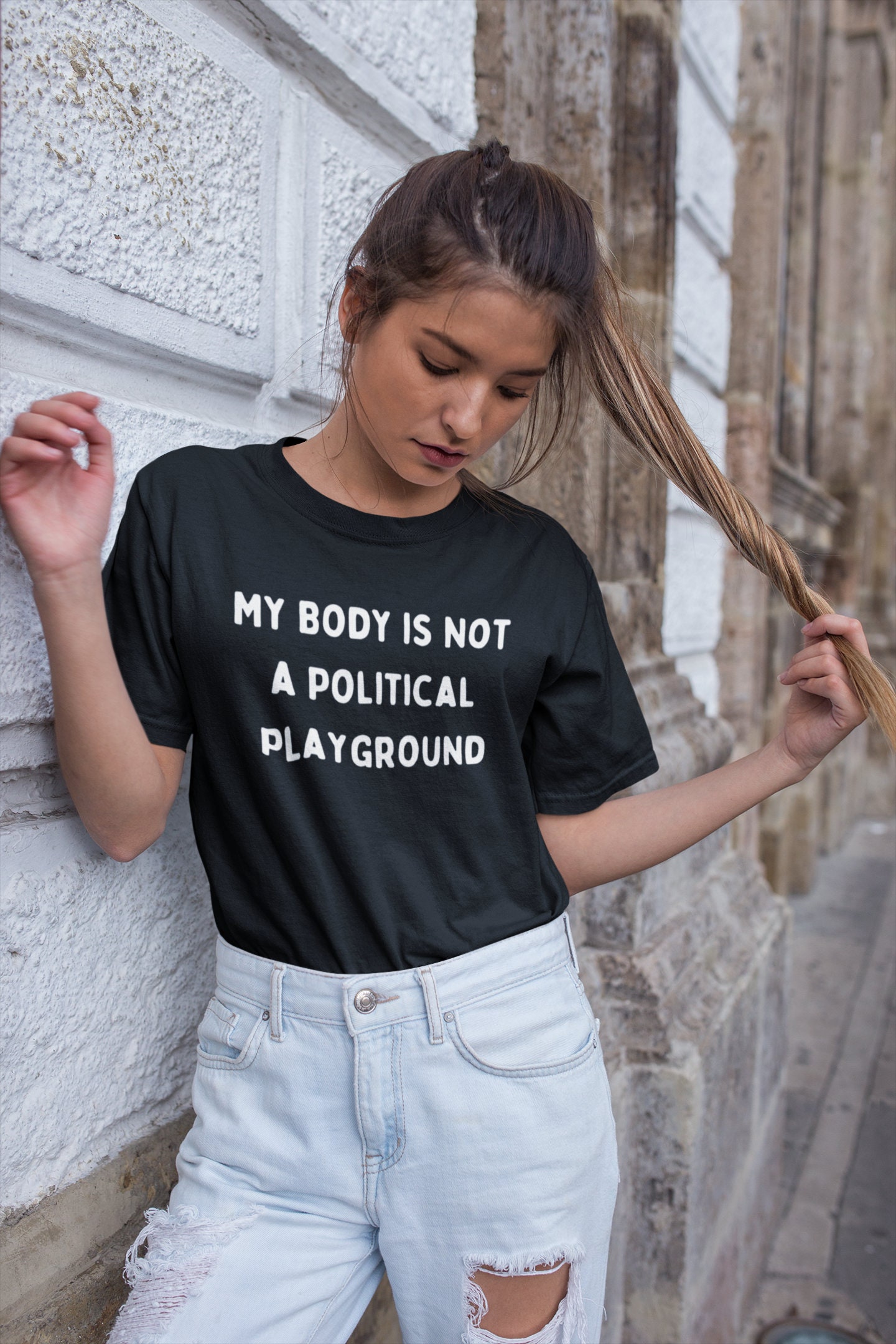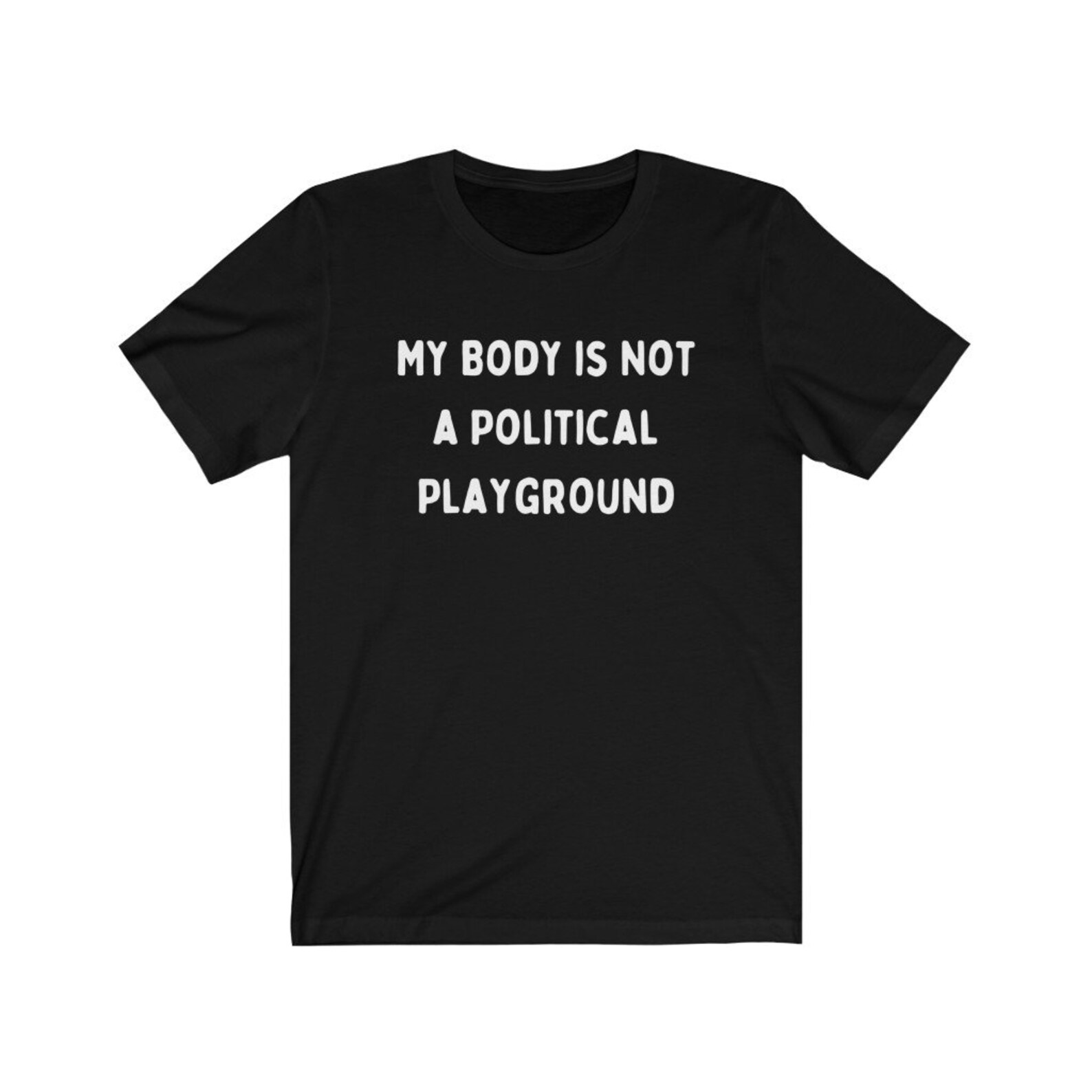Let's talk about something that’s been buzzing around lately—your body, your choice. It's not just a slogan; it's a movement, a mindset, and a call to action. The phrase "my body is not a political playground" has become a rallying cry for individuals demanding respect for their autonomy and bodily rights. This isn’t just about politics—it’s about personal freedom, dignity, and the right to make decisions about your own life.
We live in a world where our bodies are often thrust into the spotlight, debated, and legislated without our consent. Whether it’s reproductive rights, healthcare choices, or even how we choose to dress, the conversation around bodily autonomy is more important than ever. It's time to take back control and remind everyone that our bodies belong to us—and no one else.
This article dives deep into why this phrase matters, explores its significance, and provides actionable insights on how you can stand up for your rights. So grab a coffee, get comfy, and let’s chat about why "my body is not a political playground" is more than just words—it’s a revolution waiting to happen.
- Discover The Best Light Parks Near You Ndash Your Ultimate Guide To Parques De Luces Cerca De Mi
- Cocoa Butter On Scars Before And After The Ultimate Guide For Flawless Skin
Table of Contents
- What Does "My Body Is Not a Political Playground" Mean?
- Why Is Bodily Autonomy Important?
- A Brief History of Bodily Autonomy
- Understanding Your Rights
- Challenges to Bodily Autonomy Today
- Solutions and Actions You Can Take
- The Role of Law and Policy
- Impact on Mental and Physical Health
- Building a Supportive Community
- Looking to the Future
What Does "My Body Is Not a Political Playground" Mean?
Alright, let’s break it down. When people say "my body is not a political playground," they’re basically saying, "Hey, stop using my body as a pawn in your political games." It’s about reclaiming control over decisions that affect you personally—things like reproductive health, gender identity, and medical treatments. At its core, it’s about respecting individual choices without interference from lawmakers or societal pressure.
This phrase has become a powerful symbol for those fighting for bodily autonomy. It’s not just about one issue; it’s about creating a culture where everyone feels empowered to make choices that align with their values and needs. And honestly? That’s something we can all get behind.
But here’s the kicker—this isn’t just about women or marginalized groups. It’s about everyone. Because when one person’s rights are threatened, it affects all of us. It’s time to stand together and demand respect for all bodies, regardless of gender, race, or background.
- Blair Morgan Wife The Inside Story Yoursquove Been Waiting For
- Odell Burton American Idol The Journey To Stardom
Breaking Down the Phrase
Let’s dive into what makes this phrase so impactful. First off, the word "my" emphasizes ownership. Your body belongs to YOU. Period. Next, "body" highlights the physical and emotional aspects of selfhood. And finally, "not a political playground" sends a clear message: our personal lives should not be used as tools for political agendas.
Think about it—how many times have you heard politicians debating issues like abortion or transgender rights without actually consulting the people directly affected? It’s time to flip the script and give individuals the platform they deserve.
Why Is Bodily Autonomy Important?
Bodily autonomy is more than just a buzzword—it’s a fundamental human right. It’s about having the freedom to make choices about your own body without fear of judgment or punishment. Whether it’s deciding when to start a family, choosing which medical procedures to undergo, or expressing your gender identity, these decisions are deeply personal and should remain that way.
When we talk about bodily autonomy, we’re talking about trust. Trust in individuals to make informed decisions about their own lives. Trust in science and evidence-based practices to guide those decisions. And trust in society to support, rather than hinder, personal freedoms.
Key Reasons Bodily Autonomy Matters
- It promotes personal empowerment and self-determination.
- It ensures access to safe and legal healthcare options.
- It reduces stigma and discrimination against marginalized communities.
- It fosters a culture of respect and understanding.
And let’s not forget—the lack of bodily autonomy can have serious consequences. Without the ability to make choices about our own bodies, we risk losing control over our futures, our health, and our well-being. That’s why this issue is so critical—and why we need to keep pushing for change.
A Brief History of Bodily Autonomy
The fight for bodily autonomy is nothing new. Throughout history, people have been advocating for their right to control their own bodies. From suffragettes demanding the right to vote to activists fighting for reproductive justice, the struggle has taken many forms—but the goal has always been the same: respect for individual choice.
One key moment in history was the Roe v. Wade decision in 1973, which legalized abortion nationwide in the United States. This landmark case recognized the importance of reproductive rights and set a precedent for future battles over bodily autonomy. Unfortunately, recent years have seen a rollback of these rights in some areas, reminding us that the fight is far from over.
Lessons from the Past
Looking back at history teaches us valuable lessons about the importance of persistence and solidarity. It shows us that change doesn’t happen overnight—it requires hard work, dedication, and the courage to speak out even when it’s uncomfortable. And most importantly, it reminds us that every voice matters in the fight for bodily autonomy.
Understanding Your Rights
So, what exactly are your rights when it comes to bodily autonomy? Well, it depends on where you live and the laws in your area. But generally speaking, you have the right to:
- Make decisions about your reproductive health, including contraception and abortion.
- Access healthcare services without discrimination or bias.
- Express your gender identity freely and safely.
- Refuse medical treatments that go against your beliefs or values.
It’s important to note that these rights aren’t always guaranteed. In many places, individuals face barriers to accessing the care they need. That’s why it’s crucial to stay informed and advocate for policies that protect bodily autonomy for everyone.
Challenges to Bodily Autonomy Today
Despite progress, there are still significant challenges to achieving full bodily autonomy. One major issue is the influence of politics on personal decisions. Lawmakers often pass legislation that restricts access to healthcare services, particularly for marginalized communities. This can lead to increased barriers and disparities in care.
Another challenge is societal stigma. Many people still face judgment and discrimination for making choices that don’t align with traditional norms. This can create a culture of fear and silence, preventing individuals from seeking the care they need.
Overcoming These Challenges
To overcome these obstacles, we need to focus on education, advocacy, and community building. By raising awareness about the importance of bodily autonomy, we can challenge harmful stereotypes and promote understanding. And by supporting organizations that fight for reproductive justice and LGBTQ+ rights, we can help create a more equitable society for all.
Solutions and Actions You Can Take
So, what can you do to support bodily autonomy? Plenty! Here are a few ideas to get you started:
- Educate yourself on the issues and stay informed about current events.
- Support organizations that advocate for reproductive rights and LGBTQ+ equality.
- Speak out against policies that restrict bodily autonomy.
- Engage in conversations with friends and family to promote understanding.
Remember, even small actions can make a big difference. Whether it’s signing a petition, attending a rally, or simply sharing information on social media, every effort counts in the fight for bodily autonomy.
The Role of Law and Policy
Law and policy play a crucial role in shaping the landscape of bodily autonomy. Governments have the power to pass legislation that either protects or restricts individual rights. That’s why it’s so important to hold lawmakers accountable and demand policies that prioritize the health and well-being of all individuals.
One promising development is the increasing number of countries recognizing reproductive rights as human rights. This shift reflects a growing understanding of the importance of bodily autonomy and the need to protect it at all levels of government.
What You Can Do
If you want to get involved in shaping policy, there are several ways to do so. You can contact your representatives, attend town hall meetings, or participate in advocacy campaigns. By making your voice heard, you can help influence decision-makers and create positive change.
Impact on Mental and Physical Health
The lack of bodily autonomy can have serious consequences for both mental and physical health. When individuals are denied the ability to make choices about their own bodies, they may experience increased stress, anxiety, and depression. This can lead to a cycle of negative health outcomes that affect not only the individual but also their families and communities.
On the flip side, when people are empowered to make decisions about their own bodies, they tend to experience better health outcomes overall. This includes improved access to healthcare services, reduced stigma, and increased self-esteem. It’s a win-win situation for everyone involved.
Building a Supportive Community
Creating a supportive community is essential for promoting bodily autonomy. By coming together to share experiences, resources, and support, we can build a network of allies who understand the importance of individual choice. This can take many forms, from online forums to local support groups.
One key aspect of building a supportive community is practicing empathy and active listening. By truly hearing and understanding each other’s stories, we can create a space where everyone feels valued and respected. And that’s the kind of world we should all strive to live in.
Looking to the Future
As we look to the future, it’s clear that the fight for bodily autonomy is far from over. But with continued effort and dedication, we can create a world where everyone has the freedom to make choices about their own bodies without fear or judgment.
So, what’s next? Keep advocating, keep educating, and keep pushing for change. Together, we can build a brighter future for all individuals—one where bodily autonomy is not just a dream but a reality.
Final Thoughts
In conclusion, "my body is not a political playground" is more than just a phrase—it’s a movement. It’s about reclaiming control over our lives, our bodies, and our futures. And it’s about standing together to demand respect and dignity for all individuals.
I urge you to take action today. Whether it’s signing a petition, attending a rally, or simply having a conversation with someone in your life, every effort counts in the fight for bodily autonomy. Together, we can make a difference—and that’s something worth fighting for.
- Lainey Wilson Black Jumpsuit A Fashion Statement That Rocks The Red Carpet
- What Changes In A Woman When She Is No Longer A Virgin


